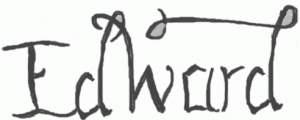Part 1…. Minor’s Orders and
Minority Interests
Born to rule –
Today it is a phrase sardonically employed to describe a social structure that enables a privileged few effortlessly to sustain positions of political influence. By way of satirical irony those whom it is used against often portray themselves as victims of an inverted social prejudice by those who would turn an accident of birth into a political crime.
Inevitably those born into privilege rarely see that they enjoy any particular advantages over their fellow man or woman. From their perspective being ‘born to rule’ imposes limitations upon freedom of choice. Though they exercise power through family, through wealth and through patronage, their lives are also circumscribed by those very privileges that make them powerful – just as others, they would argue, are empowered by the absence of such constraints.
So it seems a telling phrase only ever tells us part of any story.
Born to rule –
In the sixteenth century this phrase conveyed a simple political reality that was as unremarkable as it was determining.
And on 28th January 1547 it once again in its proper turn became a governing reality for a new king and his kingdom. On that cold January day King Henry VIII died holding the hand of Archbishop Thomas Cranmer. And his nine year old son succeeded as King Edward VI.
By chance we know quite a deal about this young boy-king. He kept a chronicle and wrote various political papers on various subjects of interest to him. The Chronicle is a sort of political dairy. It isn’t a diary in our modern sense – a confessional place for self-revelation. Edward’s chronicle is more a minute on matters that come to his attention and about which, as one can see from his entries, he is well informed.
Significantly, Edward’s journal ceases in November 1552. His part in government could no longer be constrained by others’ words nor bound by others’ actions. In the autumn of 1552 Edward meaningfully became the king. But this emergence was the culmination of a process not the product of a sudden change. It was indeed set in motion by the events of 1549. And even after he ceased to keep his journal he continued to draft political papers which have survived. The Memoranda to the Privy Council in October 1552 and his paper on the conduct of Council business in January 1553 are particularly interesting as they provide significant insights into the concerns of the early months of his active majority. Like the Chronicle they are terse but they are redolent of a practical mind that already understands the intricacies that inform policy.
Typically the things that interested Edward were also the things about which he had strongest opinions. Many of these naturally corresponded with any boy’s at most any times; others conformed to those we might expect from any educated young gentlemen of the late Renaissance; yet others reflected dynastic interests and ambitions that preoccupy most princes of the mid sixteenth century; and then there was religion.
Religion is a subject unlike any other. Religion is the present sense of the sixteenth century. More than a system of optional beliefs; more than a systematic theology; more even than a means of salvation, religion is at the philosophical heart of everything the educated and uneducated think or do. It influences thought, mathematics, science, art, culture, argument, morals and more. It defines the limits of the possible and the extent of the human. It conceives the Divine….continued here…


